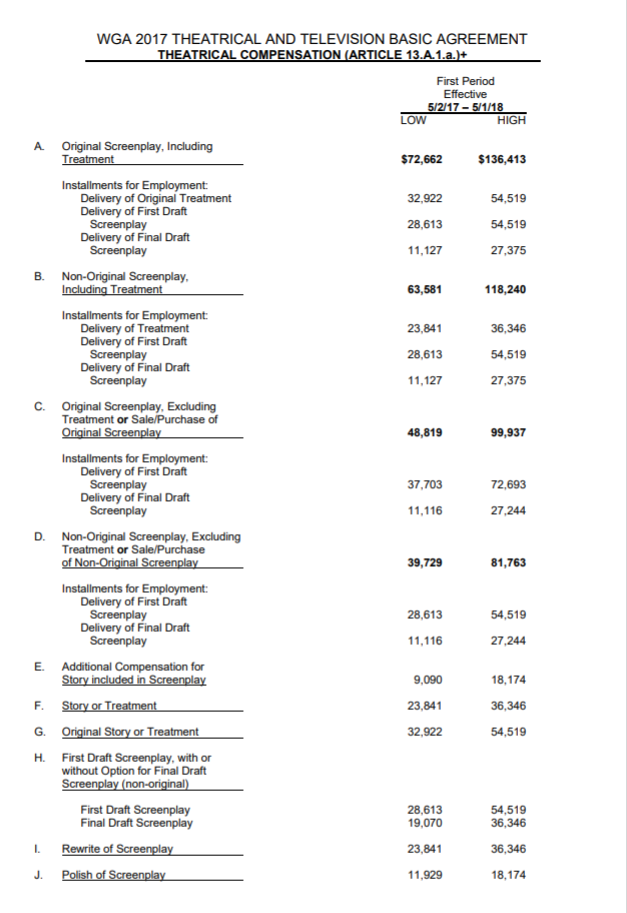In this edition of screenplay: how much money can you make? — so I can know how much to spend on limited-edition Japanese battle mech action figures; or maybe it’s just me — we’re gonna break down the REAL nuts-and-bolts of getting paid for a screenplay.
But first…
Reminds me of a conversation I had with a girlfriend years ago. I excitedly told her I had just optioned one of my scripts for $5,000, and was dreaming of huge paydays.
She said: “Couple that with what you’re already making and you’ll make what normal people make.”
Ouch. And she was right.
The expected payday is often less impressive — and more onerous — than many screenwriters imagine. Especially when you factor in the HOURS and HOURS of work — don’t forget the wrist fatigue and cost of lattes — that went into creating your masterpiece.
That said, we live in a capitalist society. And it is good to know what one can expect to get paid for their efforts.
So, here are 4 things to keep in mind before putting a down payment on that Maserati — or deciding to replace the transmission in your Mazda.
Screenplay: How Much Money Can You Make? (Like, For Reals?)
1. It’s Less Than You Think (Aim Low)
If you’re anything like me, you pored every single book that promised to show you how to sell a screenplay, and grew up hearing tales of insane spec script sales in the 80s and 90s. When Shane Black and Joe Esterzhas wouldn’t get out of bed — or fire up their word processor — for less than 3 million dollars.
Those days might as well have been the Mesozoic Era.
Things have changed so much — the industry; budgets; the agency/writer relationship — that there is NO CHANCE you’ll ever make that much with a single script sale.
Never.
Ever.
I mean it.
So, you might as well stop reading this post. You might as well give up your dream of making it as a screenwriter. And choose something more lucrative.
Like being a librarian.
What? Your’e still here?
Okay, well that means you’re deranged and that you actually can’t live without this writing “thing.” In that case, the ONLY way to make huge sums on an initial spec script are:
- If you’re a triple threat (writer/producer/director) a la J.J. Abrams
- If there’s a bidding war (with the right, concept this can actually happen)
- If your book was a bestseller and Reese Witherspoon wants to do it
Short of those three scenarios it’s very unlikely that will ever happen. Unless, of course, your name is J.J. Abrams. In which case, J.J., call me. I’ve got an idea for a Black Hole reboot I think you might appreciate.
2. “I Don’t Think That Word Means What You Think It Means”
We often think in terms of simple transactional math when it comes to selling a screenplay. But it’s much more complicated than that.
The Option
First off…you can make money without “selling” your screenplay. Thought it’s not quite as common as it used to be.
An option is simply someone giving you some moolah so they can get an exclusive window to go shop your material around. (This will usually be a producer who doesn’t have deep pockets, but has a lot of cell phone minutes and is happy to go around town to try to package your story.)
I’ve done an option three times. And made a nice chunk of change doing so. (I’ve made anywhere from $5,000 to $500 and a Starbucks gift card.) Not life-changing money, of course, but it is money.
Aside from the money though is the urgency that an option can put on a deal. You want urgency. You want people moving to get your property shopped. You do not want inertia. Inertia is not your friend.
The Step Deal
When you see a screenplay deal announced that says: “Kim Kardashian sold her spec screenplay That’s So Khloe for $500,000 against $250,000…
…what this means in practical terms is:
- Kim won’t see the full 500K unless the film goes into production
- The initial 250K is broken up into installments
- Those installments are tied to drafts, rewrites and polishes (Lucky you! The work isn’t done)
- Kim get fired anytime during the process (Poor Kim!)
Here’s a breakdown of the step minimum from the WGA (Writers Guild of America):

Here’s a link to the complete WGA minimum step breakdown: https://www.wga.org/uploadedFiles/contracts/min2017.pdf
So, let’s say Kim gets $100,000 for the first draft of That’s So Khloe. And her first draft isn’t quite as stellar as was expected. (Surprising, I know.)
And let’s say the production company wants to hire her sister, Kortney, instead. Well, they can fire Kim at any point and the payments stop there. (I’ve created a KickStarter for Kim, in case you’re feeling generous.)
3. “Greed Is Good”
Okay…so what does this mean? How much money are you putting in your pocket with the sale of a screenplay?
In my very un-scientific opinion, this means:
- If you option your script you can make between $0-$500
- If you sell a script to a low-budget production, you’ll make low five-figures (5-20K)
- If you sell a script to a higher-budget production, you’ll make mid- to high six-figures (20K-70K)
Sounds great, don’t it? I mean most of us could live on a couple of those a year.
Hold on, turbo.
4. “Everybody Gets a Taste”
You didn’t think you were just gonna set up shop here in film industry and not have to pay for a little protection, did ya?
So, before you go off and spend that 100K on a new yacht, remember that certain people are gonna want to take a bite out of your newfound wealth.
They include:
- The federal government
- Your agent
- Your manager (if you have one)
- A co-writer (if you have one)
Which means nearly 40-50% of all your profit potential is gobbled up before you buy a single Golden-Age comic. (The horror!)
Sounds depressing, don’t it?
Well, there is one remedy.
5. Always Be Shipping
Seth Godin is a marketing/small biz guru. And he has this great phrase he uses to counter the self-defeating lizard brain that is always cautious to make a mistake and gets in the way of success.
“Always be shipping.”
Always be sending product out. Even if it’s not perfect.
You want to make it the best you can, of course. But you always want to be thinking toward getting material out there. I suggest you always have three scripts you’re working on:
- The script you’re polishing
- The script you’re writing
- The script you’re thinking about
You don’t have to spend 120 hours a week on this. Just carve out time each day to chisel away at these three projects. This will do a couple cool things:
- You’ll get less attached to one single project
- You’ll have a lot more opportunities to make a sale
- You’ll have a lot more opportunities to make an impression (get invited to pitch)
And this dovetails into a question I often get: Do screenwriters have to live in LA? No, absolutely not. But if they are going to move to LA I exhort to always be shipping. Always be having product out. Always be having three things on the radar. It will make you less neurotic, sure, but it will separate you from a crowded field, by showing you are somebody who is productive and gets a lot of material done.
Which can, in turn, help you buy a lot of golden-age comics.
Got a Take on the “Screenplay: How Much Money Can You Make Selling One” Debate?
Do you have an opinion on the “screenplay: how much money can you make with one” question? Have you sold or optioned a script? We’d love to hear in the comments below.






